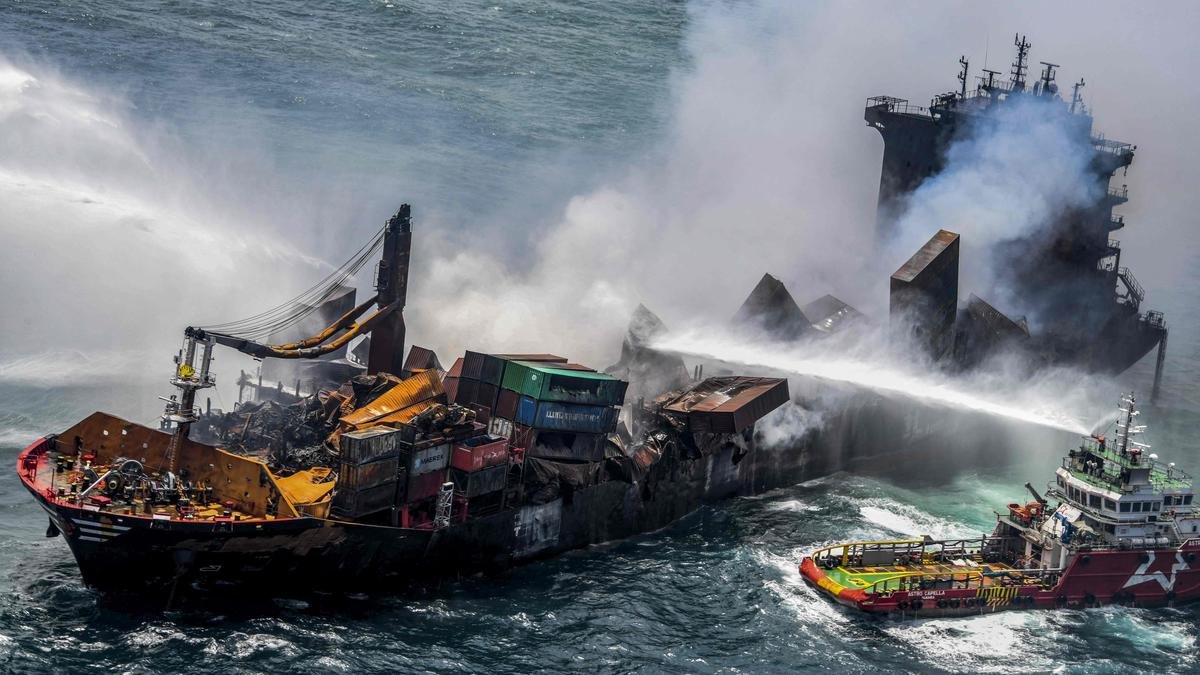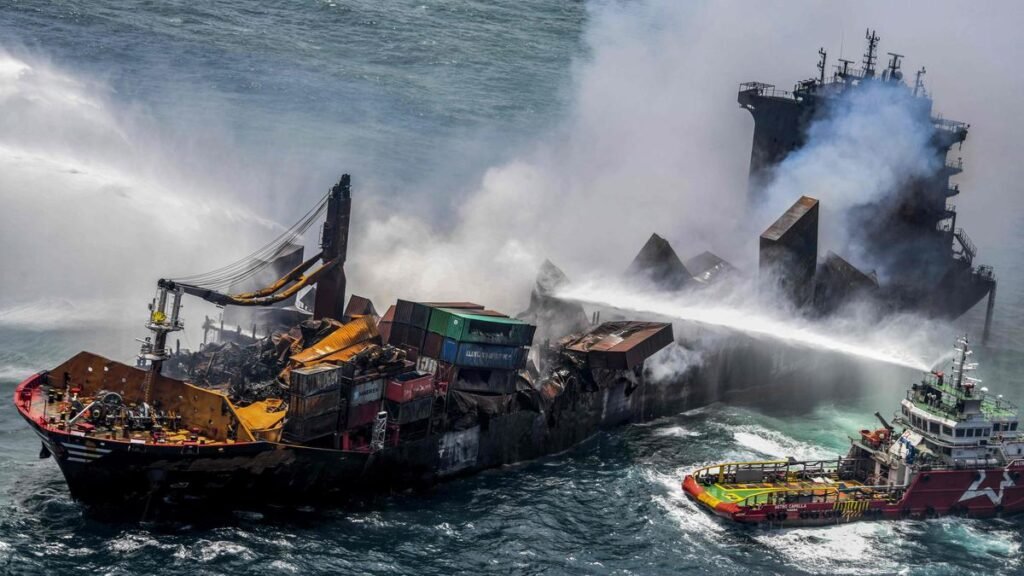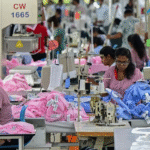
Sri Lankan Supreme Court orders $1 bn compensation over X-Press Pearl disaster

The ruling relates to the catastrophic maritime disaster in May 2021, when the Singapore-flagged cargo vessel caught fire and later sank off the Western coast of Sri Lanka, unleashing what experts have described as the worst marine pollution event in the island’s history
In a landmark judgment that could redefine environmental accountability in South Asia, the Supreme Court of Sri Lanka has ordered non-state actors — including the owners, operators, and local agents of the ill-fated MV X-Press Pearl — to pay $1 billion as interim compensation to the Sri Lankan treasury.
The ruling relates to the catastrophic maritime disaster in May 2021, when the Singapore-flagged cargo vessel caught fire and later sank off the Western coast of Sri Lanka, unleashing what experts have described as the worst marine pollution event in the island’s history.
The verdict followed the hearing of four Fundamental Rights petitions filed by fishermen, Catholic clergy, and environmental groups. Among the petitioners was Sri Lanka’s most senior Catholic prelate, Cardinal Malcolm Ranjith. Nearly 20 respondents were named, including former President Gotabaya Rajapaksa (represented by the Attorney General), several ministers, senior public officials, and heads of agencies responsible for marine environmental protection. The vessel’s owners, operators, and local agents were collectively referred to by the Court as the “X-Press Pearl Group.”
Upholding the “polluter pays” principle, the Court found that both the X-Press Pearl Group and state actors had violated the fundamental rights of the petitioners — and, by extension, the people of Sri Lanka. In a rare move, the Court also ruled that Sri Lanka’s Attorney General’s Department (AGD) had violated citizens’ rights by failing to pursue appropriate legal action against the responsible parties.
A slow-burning disaster
The MV X-Press Pearl was a Singapore-registered container ship operated by X-Press Feeders. On May 20, 2021, while anchored off Colombo, it caught fire while carrying a highly hazardous cargo — including 25 tonnes of nitric acid, methanol, caustic soda, lubricants, and an estimated 400 containers of plastic nurdles (small, pre-production plastic pellets used in manufacturing). The ship burned for nearly two weeks before sinking, triggering a major marine pollution crisis.
An estimated 1,600 tonnes of plastic nurdles tonnes of plastic nurdles were spilled into the ocean and along Sri Lanka’s western coastline, causing extensive and lasting environmental damage. These lentil-sized pellets, which absorb and concentrate toxic chemicals, are often mistaken for food by marine species. The United Nations Environment Programme (UNEP) later described the incident as potentially the worst marine plastic pollution event from a single vessel in history.
A recent BBC investigation found that the nurdles continue to absorb pollutants like heavy metals from the sea and are getting more toxic over time, compounding the long-term threat to marine ecosystems.
In the weeks that followed, tonnes of dead marine animals — including dolphins, turtles, and fish — washed ashore. Coastal fishing communities, especially in the Western Province, were devastated by fishing bans, leading to severe economic and cultural impacts.
Attorney General’s department under fire
The Court was sharply critical of the Attorney General’s Department, particularly for its decision to file a civil compensation claim in Singapore rather than pursuing legal proceedings in Sri Lanka. The Court described this move as “unreasonable, irrational, and arbitrary.”
It was revealed during the hearings that the AGD had entered into an agreement with the shipowners granting “exclusive jurisdiction” to Singaporean courts — effectively sidelining Sri Lanka’s own legal system. The Court concluded that the AGD had infringed upon the rights of Sri Lankan citizens by failing to indict the ship’s owners and operators, thereby undermining national sovereignty and accountability.
The Court also held former State Minister of Urban Development Dr. Nalaka Godahewa, the Marine Environment Protection Authority (MEPA), and its former chairperson Darshani Lahandapura responsible for violating the fundamental rights of citizens due to their failure in prevention, oversight, and timely response.
Corruption allegations and police investigations
In 2023, several parliamentarians alleged that the shipowners had paid a USD 250 million bribe to certain AGD officials to derail the compensation process. The police launched an investigation based on a complaint filed by a senior MEPA official — but the inquiry has since been stalled.
In its ruling, the Court has directed the police to resume investigations into all criminal aspects of the case, including the bribery allegations, and to submit a progress report within three months.
Additionally, the Court announced the formation of the MV X-Press Pearl Compensation Commission, which will undertake a comprehensive assessment of the environmental and economic damages. The USD 1 billion ordered is considered an interim payment and may be revised upward based on the commission’s findings.
Beyond the petitioners’ demands
Dr. Ravindranath Dabare, who represented several petitioners, told The Hindu that the judgment had exceeded expectations. “The Supreme Court went well beyond what the petitioners asked for. It recognised not only the environmental loss but also the systemic failure of the state in its duty to protect the people’s fundamental rights,” he said.
The ruling has been welcomed by environmentalists, legal experts, and affected coastal communities as a rare and powerful assertion of environmental justice in South Asia — where foreign corporate polluters often avoid liability.
Legal scholars suggest that the ruling may set a regional precedent for addressing transboundary environmental harm and enhancing corporate accountability, particularly in the context of hazardous maritime cargo.
Can the ruling be enforced?
One of the AGD’s primary justifications for filing the civil case in Singapore was uncertainty over whether a Sri Lankan court judgment could be enforced internationally. However, Dr. Dabare argues that the Court has addressed this concern by defining the “X-Press Pearl Group” to include the vessel’s local agents — thereby ensuring domestic enforceability. “If they fail to comply, local agents will face the full force of Sri Lankan law,” he said.
Meanwhile, the Singapore civil suit remains on hold, pending an appeal in the UK Admiralty Court. The UK court is reviewing an earlier decision to limit the shipowners’ liability to £19.8 million — a fraction of the damage Sri Lanka claims to have suffered.
With the Supreme Court’s ruling now far exceeding that liability cap, Dr. Dabare contends that it is no longer viable for Sri Lanka to pursue both legal avenues. “This ruling marks a definitive legal stance,” he said.
The shipowners have yet to publicly respond to the judgment.
-Saroj Pathirana is a Fellow at the Pulitzer Ocean Reporting network.
source: https://www.thehindu.com/news/international/sri-lankan-supreme-court-orders-1-bn-compensation-over-x-press-pearl-disaster/article69856149.ece



